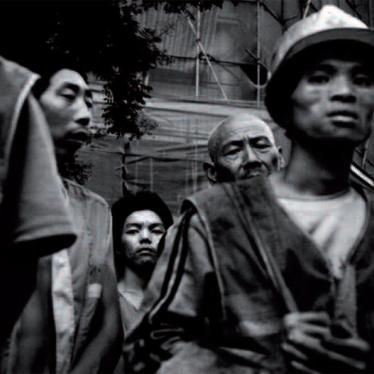(New York) - The Chinese government should ensure that the rights of China's estimated 150 million migrant workers are not sacrificed as Beijing copes with the ongoing global economic crisis, Human Rights Watch said today.
Migrant workers have helped to spur China's dramatic economic growth rate over the past three decades. Yet recent research and studies by leading government-affiliated bodies and research organizations conclude that migrant workers are the earliest casualties of any economic downturn.
"China's massive migrant worker population is already socially, economically, and legally marginalized and is uniquely vulnerable to the global slowdown's effects on China," said Brad Adams, Asia director at Human Rights Watch. "The economic crisis could well spark a ‘race to the bottom' in rights protections and work conditions as employers exploit migrants desperate to work."
Violations of migrants' rights were well-documented long before the current economic crisis. Migrant workers are denied the right to collective bargaining or to form trade unions outside the official All China Federation of Trade Unions. Financial and bureaucratic constraints often prevent workers from obtaining legal redress for owed wages and other labor rights violations.
Many migrant workers, particularly in construction, have long suffered from wage exploitation by employers who deny them legally stipulated labor contracts. Many employers routinely violate laws requiring monthly salary payments and instead make migrants wait for an annual payment ahead of the Lunar New Year. Such payments are often below official minimum wage standards. In many cases, employers cheat migrants of the entirety of their yearly wages.
Human Rights Watch said that migrant workers often have inadequate food and housing and unsafe working conditions, which increase the risk of illness and disability. Most have no medical or accident insurance, and shrinking job opportunities may force increasing numbers of migrants to seek work in the country's most dangerous industries such as mining and construction.
A recent study by the Chinese Academy of Social Sciences indicates that migrants are the front-line victims of the country's economic downturn through mass layoffs in the migrant-dominated export manufacturing sector. China's Ministry of Human Resources and Social Security has indicated that up to 10 million migrants lost their jobs in 2008 due to the financial crisis. A recent study by China's Tsinghua University suggests that up to 50 million migrant workers will lose their urban jobs in 2009 if the economic downturn continues.
Human Rights Watch said that growing joblessness will threaten the already fragile protections for migrant workers built into China's constitution, labor law, and at least 16 other central government and municipal government laws, regulations, and directives.
"In a country that has not yet established the rule of law, the weakest in society will be the most vulnerable to exploitation," said Adams. "The Chinese government should prioritize the development of welfare and re-employment schemes for migrant workers and ensure that unscrupulous employers don't take advantage of unemployed migrants as the economy worsens."
Human Rights Watch is particularly concerned that the economic crisis will amplify existing human rights violations linked to China's discriminatory household registration, or hukou, system. Migrants from the countryside have long been denied social welfare benefits available to residents with urban hukou, including state-sponsored retirement pensions and medical care. Although some municipalities have temporary urban hukou programs, the majority of migrant workers remain deprived of urban hukou-related rights and benefits.
In January 2008 Ma Liqiang, the deputy secretary general of China's official National Development and Reform Commission, indicated that the restrictions in the hukou system would be eliminated by 2020, but without giving a specific timetable.
In November 2008 the Beijing municipal government reinforced the discriminatory nature of the urban hukou system by announcing a system that will provide employers annual subsidies of up to 10,000 yuan (US$1,470) for employing urban hukou-holding jobseekers. That system explicitly denies the same employment opportunities to non-hukou-holding migrant workers. This measure may not deter migration to Beijing by the rural poor, and does nothing to address the plight of unregistered migrants who still live there.
Human Rights Watch pointed out that rising unemployment among migrants will also imperil their children's right to education, as laid-off migrants become unable to pay tuition fees. Although Chinese law decrees nine years of free compulsory schooling, lack of funding for rural education requires many students in the countryside to pay to attend state schools. Migrants' remittances to their families in rural areas - which a World Bank study indicated reached US$30 billion in 2005 - have been essential in enabling migrants' children to get an education.
"If the Chinese government is sincere about achieving a ‘harmonious society,' it needs to start taking a zero-tolerance approach to employment discrimination against migrants," said Adams.







